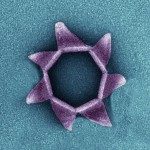Lien vers Pubmed [PMID] – 24348094
Archaea 2013;2013:372396
It is often assumed that eukarya originated from archaea. This view has been recently supported by phylogenetic analyses in which eukarya are nested within archaea. Here, I argue that these analyses are not reliable, and I critically discuss archaeal ancestor scenarios, as well as fusion scenarios for the origin of eukaryotes. Based on recognized evolutionary trends toward reduction in archaea and toward complexity in eukarya, I suggest that their last common ancestor was more complex than modern archaea but simpler than modern eukaryotes (the bug in-between scenario). I propose that the ancestors of archaea (and bacteria) escaped protoeukaryotic predators by invading high temperature biotopes, triggering their reductive evolution toward the “prokaryotic” phenotype (the thermoreduction hypothesis). Intriguingly, whereas archaea and eukarya share many basic features at the molecular level, the archaeal mobilome resembles more the bacterial than the eukaryotic one. I suggest that selection of different parts of the ancestral virosphere at the onset of the three domains played a critical role in shaping their respective biology. Eukarya probably evolved toward complexity with the help of retroviruses and large DNA viruses, whereas similar selection pressure (thermoreduction) could explain why the archaeal and bacterial mobilomes somehow resemble each other.

